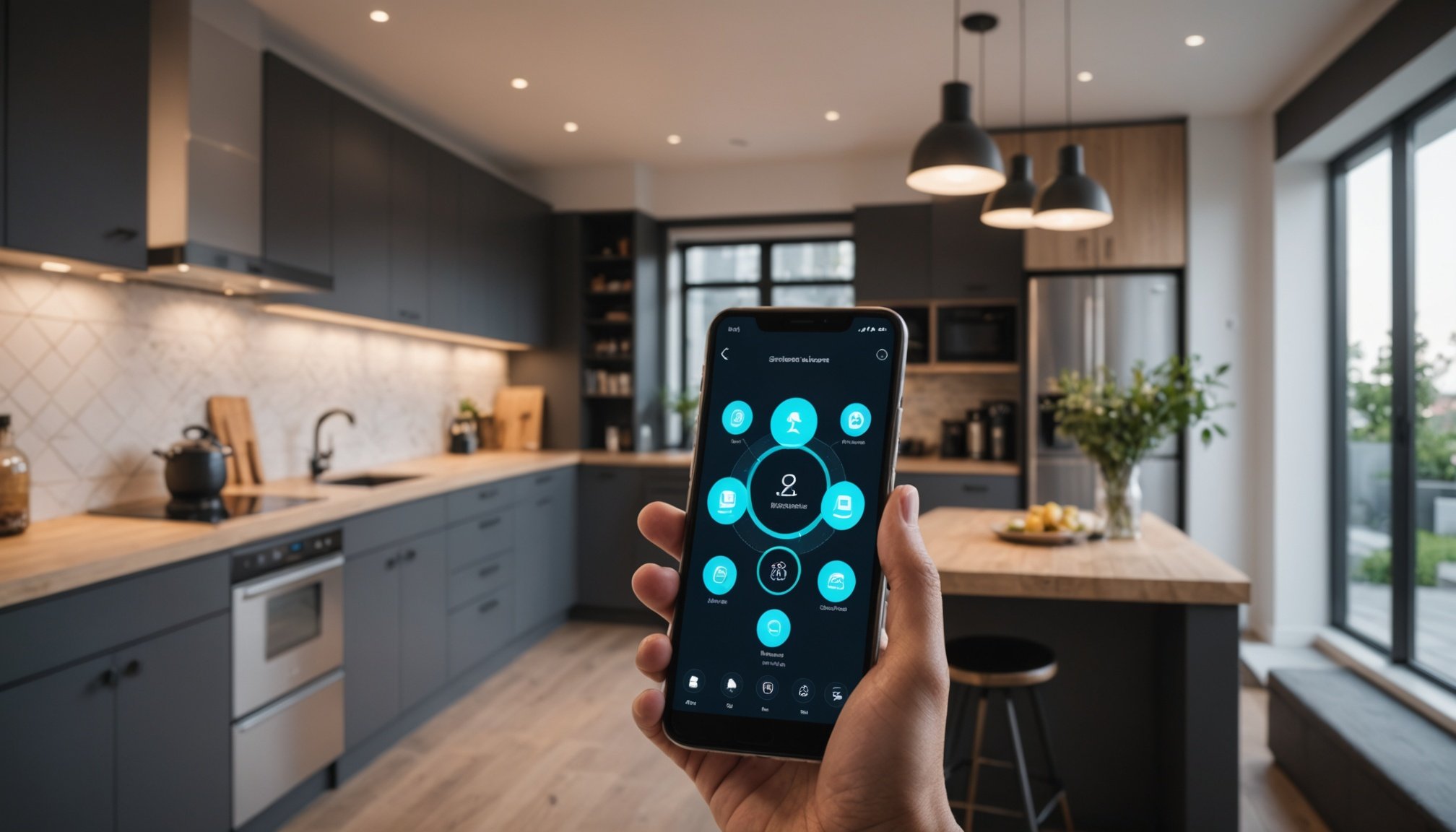AI Applications in Smart Homes
AI in smart homes has revolutionised modern living by seamlessly integrating technology into our daily routines. Through the power of home automation, intelligent systems are now able to learn and adapt to user preferences, providing a tailored experience that enhances comfort and convenience.
One prominent technology in use is machine learning, which allows devices to predict and respond to a user’s habits effectively. For instance, smart thermostats can automatically adjust temperatures based on historical data and behaviour patterns. Such intelligent home systems not only improve energy efficiency but also ensure optimal comfort.
Also to see : Mastering AI Detection: a guide to ensuring content authenticity
Data analytics plays a vital role in this ecosystem, processing vast amounts of information to make insightful decisions. AI-powered devices like smart speakers, security systems, and lighting solutions leverage these analytics to create interconnectivity within the home. For example, a security system can identify unusual activities and alert the homeowner proactively.
Examples of AI-powered devices enhancing home automation include smart fridges that track grocery stock and suggest shopping lists, and voice assistants that control various home functions with simple commands. By employing these technologies, intelligent home systems offer an unparalleled level of convenience and efficiency, paving the way for future developments in home automation.
This might interest you : Revolutionizing renewable energy: how ai innovates management for optimal efficiency
User Benefits of AI in Smart Home Automation
Artificial Intelligence (AI) is revolutionizing the user experience in smart homes by offering unparalleled convenience. Through personalized automation, AI systems learn your habits and preferences, adjusting settings like lighting, temperature, and even media profiles without manual input. This seamless operation enhances the efficiency and comfort of smart living benefits, making everyday tasks quicker and easier.
Additionally, AI plays a pivotal role in promoting energy efficiency. Smart systems can optimize energy consumption by identifying usage patterns and suggesting changes that result in significant cost savings. For instance, AI can automatically adjust heating or cooling depending on occupancy, reducing unnecessary energy expenditure.
In terms of home security, AI applications have made significant strides. Facial recognition and anomaly detection technologies provide robust security measures, alerting homeowners to potential threats in real time. This gives homeowners greater peace of mind, knowing their homes are secure and that they have instant access to security insights.
Here are some key benefits:
- Enhanced convenience with automatic adjustments.
- Substantial cost savings through optimized energy use.
- Strengthened home security with real-time alerts.
These advancements position AI as a crucial component of an efficient, secure, and intelligent home environment.
Examples of Automation Features in AI-Enhanced Smart Homes
In recent years, automation features have significantly transformed our living spaces, particularly with the inclusion of smart appliances. These intuitive home technologies offer seamless interactions that cater to user preferences and enhance everyday life.
Smart Lighting Solutions
Smart lighting is at the forefront of intuitive home technology. With the ability to customise lighting settings based on time, mood, or activity, these systems exemplify modern convenience. For instance, linking smart bulbs to motion sensors allows for automatic light adjustments, promoting energy efficiency and convenience.
Intelligent Climate Control
Another vital aspect is intelligent climate control, a feature that ensures comfort while being energy-conscious. By learning user habits and preferences, these systems can autonomously regulate temperatures, maintaining an optimal environment without manual input. This smart appliance responds to both immediate needs and scheduled routines, making energy use more efficient.
Security Systems with AI Integration
Security integrations within smart homes have seen significant enhancements through AI. These systems now offer real-time monitoring, facial recognition, and even threat detection. By utilising advanced algorithms, they provide enhanced safety by automatically alerting homeowners and authorities of potential breaches.
By embracing these automation features, smart homes improve user experience, developing environments that are user-friendly and progressively efficient. Case studies show successful real-world AI integrations, further highlighting the practicality and benefits of intelligent home technologies.
Traditional vs. AI-Enhanced Smart Home Systems
In the smart home comparison between traditional systems and AI-enhanced systems, distinct differences arise. Traditional home automation systems typically operate on pre-set routines and manual controls, limiting flexibility and adaptability. Conversely, modern home technology with AI integration offers a more dynamic approach, learning from user behaviours and preferences to automate tasks intelligently.
AI-enhanced systems provide a higher level of user satisfaction due to their ability to tailor experiences to individual needs. Users often find that these systems adapt over time, reducing human input for managing various aspects of home life. For example, AI systems can adjust heating or lighting based on occupancy and personal preferences, offering convenience that traditional options simply can’t match.
Looking towards future trends, AI technology is expected to deepen its integration within smart homes. The advancement in AI capabilities promises more seamless interactions and smarter decision-making within home environments. Modern home technology not only aims to enhance comfort but also energy efficiency and security, steering households towards a more sustainable future. As these systems evolve, the line between traditional and AI-enhanced systems may blur, establishing new standards in smart home functionality.
Practical Tips for Integrating AI in Smart Homes
Integrating AI into your smart home setup can seem daunting, but following a structured method can simplify the process significantly. Begin by identifying the specific needs of your household to select appropriate AI devices. Consider devices like smart speakers, thermostats, or security systems that can enhance daily activities.
Technology adoption in a smart home requires ongoing evaluation of compatibility and connectivity. Ensure that the AI devices you choose can seamlessly connect with existing systems within your home. This step is crucial to creating a cohesive and efficient smart home environment. Compatibility can prevent frustrations and unnecessary costs in the long run.
To maintain optimal technology adoption and performance, utilize available resources. Manufacturer websites, online tutorials, and user forums are valuable for troubleshooting potential issues. These resources offer tips to enhance AI performance, ensuring your smart home remains efficient.
Adapting to new technologies shouldn’t be intimidating. By focusing on connectivity and leveraging available resources, you can keep your home at the cutting edge.
Privacy and Security Concerns in AI Home Automation
AI home automation systems offer convenience but pose significant privacy issues. They collect vast amounts of data, including personal habits and preferences, that may be susceptible to breaches. Understanding these privacy concerns helps users make informed decisions about their smart home devices.
To mitigate security risks, adopt best practices for safe AI usage. Start by regularly updating device firmware to protect against known vulnerabilities. Use strong, unique passwords for devices and enable two-factor authentication when available. It is also crucial to review and adjust device privacy settings to limit unnecessary data sharing.
Legal regulations play a crucial role in safeguarding user data. Familiarize yourself with laws like the General Data Protection Regulation (GDPR) and the California Consumer Privacy Act (CCPA), which provide guidelines for data protection. Ethical considerations, such as transparency in data usage and the option to opt-out of data collection, are equally important for safe AI usage.
Safe AI usage depends on both technology and user awareness. By staying informed about these practices and regulations, users can better protect their homes while enjoying the benefits of AI automation.






